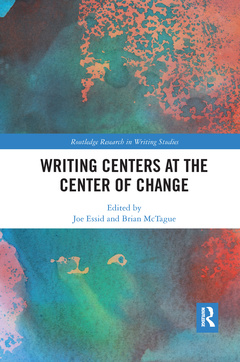Writing Centers at the Center of Change Routledge Research in Writing Studies Series
Coordonnateurs : Essid Joe, McTague Brian

Writing Centers at the Center of Change looks at how eleven centers, internationally, adapted to change at their institutions, during a decade when their very success has become a valued commodity in a larger struggle for resources on many campuses.
Bringing together both US and international perspectives, this volume offers solutions for adapting to change in the world of writing centers, ranging from the logistical to the pedagogical, and even to the existential. Each author discusses the origins, appropriate responses, and partners to seek when change comes from within a school or outside it. Chapters document new programs being formed under changing circumstances, and suggest ways to navigate professional or pedagogical changes that may undermine the hard work of more than four decades of writing-center professionals.
The book?s audience includes writing center and learning-commons administrators, university librarians, deans, department chairs affiliated with writing centers. It will also be useful for graduate students in composition, rhetoric, and academic writing.
I: New or Reimagined Spaces Chapter One: Sharing Space and Finding Common Ground: A Practical Guide to Creating Effective Writing Center/Library Partnerships Chapter Two: The Writing Center Speaks Up: On Dissonance, Collaboration, and Harmonization With the Learning Commons Chorus Chapter Three: Online Tutoring: From Writing Center to Virtual Education HubII: New MissionsChapter Four: The Writing Center in The Writing Program – Peer Tutoring Across Disciplines And LanguagesChapter Five: At the Centre of Changing Contexts: A Writing for Life CentreChapter Six: Black in the Writing Center: Race, Representation and the Post-Racial LieChapter Seven: Making Good on the Promise: A Community College in Virginia Collaborates with a Technical Secondary School in Buenos Aires, Argentina to Grow Student SuccessIII: Contested Missions, Contested Spaces Chapter Eight: I Feel the Earth Move Under My FeetChapter Nine: When The Story Of The University Changes – What Happens To The Mission Of The Writing Center?Chapter Ten: From Writing Center to Writing Program? Transdisciplinarity as a Means to Institutional Credibility and SupportChapter Eleven: Negotiating the Complexities of Being A Part of and Apart From
Joe Essid, University of Richmond, studies the role of writing centers in curriculum development and the transition to college writing. He co-edited Identity and Leadership in Virtual Communities: Establishing Credibility & Influence. Hershey, PA: IGI Global, 2013. His articles have appeared in Kairos, Writing Lab Newsletter, and Educause Quarterly.
Brian McTague has been the director of the Virginia Commonwealth University Writing Center since 2013. His pedagogical interests include reflective and creative academic writing, teaching writing to non-traditional students, such as those with learning differences, and making writing education accessible to all, including via the community writing center model.
Date de parution : 09-2021
15.2x22.9 cm
Date de parution : 09-2019
15.2x22.9 cm
Thème de Writing Centers at the Center of Change :
Mots-clés :
WC; Synchronous Online; writing studies; Black English; writing administration; Black English Vernacular; WPA; GPA Requirement; writing center directors; Virginia Community College System; comparative; IBM Employee; composition; Synchronous Online Consultations; tutoring; Learning Commons Space; learning commons; Leaving Certification Exams; transition; higher education; Writing Center Work; international; Common Language; college; Reflective Practice; university; Synchronous Online Tutoring; writing program; Ell Student; writing centers; WCAs; online tutoring sessions; WID Program; culture of collaboration; WC Tutor; Stem Field; Virginia Community College; Peer Tutors; Black Consultants; Anchor Resident; EU Policy Document



